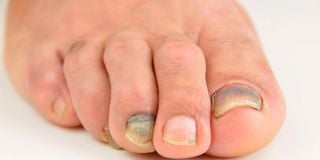What causes the blood clots that are visible under nails?

What you need to know:
- The blood disorders may be due to a genetic illness. It may also be caused by some medications.
Dear Doc,
Thank you for keeping us informed. My son likes jogging but has noticed that he keeps on developing painful blood clots on his toenails which later disappear on their own. This occurs when he has neither stumbled nor had any injury to his toes or feet. I, on the other hand, prefer walking and have a similar problem like his. The clots appear not only on my toenails but also on my shin and thighs. What could be the problem?
Anne
Dear Anne,
The clots that your son and you are experiencing are most likely from a bleeding or clotting disorder, causing easy bruising and bleeding under the nail bed and the skin. The blood disorders may be due to a genetic illness, especially since you both have it. It may also be caused by some medications, liver disease, kidney disease, Vitamin C deficiency, Vitamin K deficiency, among others.
These disorders pose the risk of heavy bleeding, either following trauma or even unprovoked. Symptoms of spontaneous bleeding include recurrent nose and gum bleeds, blood in stool, urine, vomit or sputum; low blood level (anaemia), low blood pressure, weakness and fainting, easy fatigability, swollen and painful joints; headache and neck stiffness. You may also have noticed prolonged/excessive bleeding after a minor injury, heavy menses and heavy bleeding during delivery or any surgical procedure.
It is advisable for both of you to be seen by a doctor for examination, and relevant tests. Depending on the findings, you may be referred to a blood specialist (haematologist) for a follow-up. Some of the underlying causes of the disorder can be treated. As for genetic illnesses, there is no cure but they can be managed.
Dear doc, I have for quite some time experienced skin rashes especially on my face. When I take metronidazole, they momentarily disappear and appear after a while. What may be the reason?
Ali
Dear Ali,
The recurrent skin rashes, especially on the face, could be due to many causes including infection, inflammatory conditions, or allergy. Because the rash disappears when you use metronidazole, it is likely that you have acne rosacea. Acne develops due to a combination of factors, which include hormonal changes (increased testosterone levels), infection and the amount of natural oily substance (sebum) produced by your skin. Pimples develop when hair follicles are blocked by sebum and dead cells. The biggest problem with acne is aesthetic — how you look. The resulting pimples, white heads, black marks or scars are not pleasing to look at.
To manage acne, clean your face twice a day: in the morning and in the evening before bed. Also, shower after activities that make you sweat a lot. Use mild soap and a gentle towel. Do not scrub your face while cleaning it, since it is already sensitive. Take lots of water; fruits and vegetables; and also exercise. Avoid skin products that may be harsh to your skin and protect your skin from the sun. Avoid pressing the pimples as this leads to developing black marks.
Visit a dermatologist for advice on medications you can use to control the rash. There are medications to control infection (like metronidazole gel or tablets), and medication to control the swellings and excess oil production. For many people, it takes a while before you get medication that works for you specifically, so be patient.
How can one prevent renal infection? Also, what precautions should one take to ensure one’s kidneys are intact? Please shed light on this.
Alnashir D Walji
Dear Walji,
To maintain good kidney health, take adequate amounts of water, eat a well-balanced diet that is rich in fruits, vegetables and whole grains, exercise and maintain a healthy weight. This also helps to prevent, delay and/or control other conditions like diabetes, hypertension, obesity and high cholesterol. Monitor your blood pressure and control it appropriately if you have hypertension. Monitor your blood sugar levels and control them as directed if you are diabetic. Controlling high blood pressure and diabetes is vital, as these are the leading causes of kidney disease. In addition, do not take excess alcohol, avoid/quit smoking, avoid overuse of painkillers and antibiotics, avoid herbal medication, and reduce salt intake.
Renal infections either get to the kidneys by travelling up from the lower part of the urinary system (bladder and urethra) or spread through blood from an infection in another part of the body. Lower urinary tract infections can be prevented by using clean toilets, going to the toilet as soon as you need to urinate and empty the bladder completely, and taking a lot of water daily. Sexually transmitted infections can also contribute to urinary tract infections. For older men with prostate enlargement, difficulty passing urine needs to be treated since it can predispose one to recurrent urinary tract infections and cause kidney damage when there is severe blockage.
Send your health questions to: [email protected]


